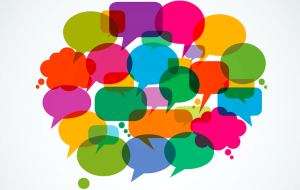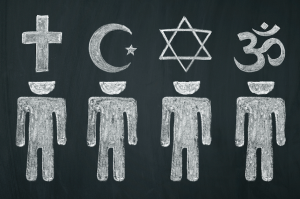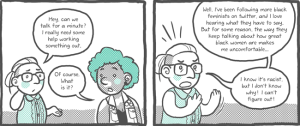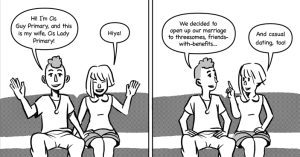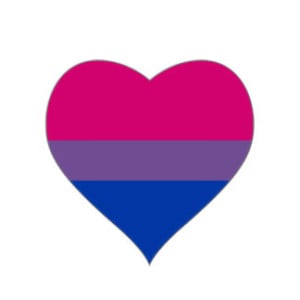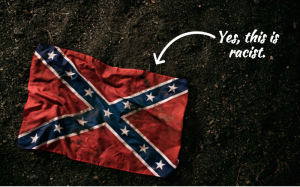From the meteoric rise of Laverne Cox to Caitlyn Jenner’s high-profile coming out, I have no doubt that you’ve been encountering plenty of thinkpieces about transgender issues floating around your newsfeed lately.
If transgender issues are new to you, I’m sure the vocabulary and rhetoric surrounding the movement can be daunting at times. If you need a refresher course on which terms to use and what they mean, click here.
Far too many people run away from vital discussions that could change our society, because they are either afraid or weary of so-called “Political Correctness.”
I completely understand why others feel the urge to reject the idea of “Political Correctness” – when you feel like you can’t win, you don’t want to try.
Inclusive speech isn’t about being “Correct,” though. It’s about being respectful.
There are rules to trans-inclusive speech, but they have a purpose: to dignify transgender people.
The reason to care about using inclusive language comes down to the Golden Rule: Do you want to be treated with dignity?
I know I do. The desire to be treated with dignity is a large part of why I am a feminist. When you use inclusive language, you are treating transgender people with that same dignity that you want. Even if it means looking up some vocabulary words. And apologizing when you mess up.
Because, spoiler alert: You’re going to mess up sometimes.
Want to know a Feminist-Blog-Insider-Secret? When it comes to inclusive speech, everyone has messed up at least once. Even diehard activists. Even your favorite progressive stand-up comic. Even me.
It may be a cliche, but nobody’s perfect. Everyone makes mistakes, but what matters is what we do afterward. You have options. All is not lost.
You can apologize for the effect of your transgression. Beyond that, you can examine your biases and misinformation. The Internet is at your fingertips – educate yourself! Just like any other faux pas, you absolutely can put in effort to correct your mistake going forward. Making one mistake doesn’t brand you as a terrible person forever.
It all comes down to being thoughtful and respectful, which is why activists care about the language we use.
That’s a lot of work surrounding word choice.
It sounds obvious, but activists and allies care about the language used to discuss trans issues, because words carry meaning far deeper than just the conversation at hand.
Other writers have covered how to talk to and about trans people. Today, we’re going to unpack why it all matters.
Here are some common questions I’ve seen other cis people ask.
1. ‘You Get What I Mean – Why is Trans Jargon Necessary?’
When discussing any topic, specificity of language facilitates understanding.
That’s why musicians learn theory, medical students learn anatomy, and activists push for accurate and respectful language in media and in their personal lives
Transgender activists and allies use a specific set of terms out of love for transgender people and for a truly practical reason: to establish a system for the sake of clarity and etiquette. For a list of appropriate versus inappropriate terms to use, please click here.
When we make it a point to use correct, respectful language, we reinforce this system created by and for trans people. Furthermore, when we uphold the guidelines of respectful language, we lead others by example.
When we reinforce the system trans people created, we are also reinforcing the existence and importance of trans people.
That may sound trite, but there are still many people out there who honestly believe that transgender identity “isn’t a real thing.” You can stand up for transgender people’s existence simply by upholding the etiquette they created.
Ultimately, you want the words you say to carry out the meanings you’re trying to convey. When you use the appropriate terminology, you are more likely to be understood.
Using the appropriate terms will fulfill your need to be understood as well as transgender people’s need for respect.
We can encourage a paradigm shift if we come together, educate ourselves, and insist upon proper terminology when we talk to and about trans people.
Using accurate, respectful terminology isn’t about giving everyone a vocabulary pop quiz – it’s about treating an oppressed group of people with dignity and encouraging others to do the same.
2. ‘But That’s Not What Their Mother Named Them – Why Can’t I Call Them Their ‘Real’ Name?’
If you ask anyone the question, “Who are you?” the first piece of information they usually give is their name. Names act as a way to signify who we are in a greater sense.
If someone tells you their name, you speak and refer to them in that manner.
This idea applies to transgender people as well as cisgender people, which shouldn’t be so difficult to digest – yet people have the hardest time with it.
We can all hop on board when a cis person changes their last name when they get married, if Prince feels a stronger connection to a symbol than a formal name, or if Snoop Dogg changes his stage name to Snoop Lion.
But for some odd reason, cis people think that a trans person’s name is a work in progress up for discussion.
When people question, challenge, or deny a trans person’s name – especially when it has been clearly spelled out for everyone ( i.e., “Call Me Caitlyn”) – they are implicitly saying that the trans person’s identity is less important than their opinion of it.
We live in a world and an Internet full of sentiments like “Just be true to yourself, and everything will work out!”
Going by a name that matches one’s identity is the epitome of being true to oneself. Still, transgender people have to fight just to have their names used by the people in their lives. Some transgender people are not even afforded the respect of an obituary with the proper name.
Regardless of any outsiders’ actions, transgender identity as a whole will never disappear. Trans people will still be trans and will still deserve respect, no matter what you may hear from Internet trolls, Trans-Exclusionary Radical Feminists, and/or GOP candidates.
Outside viewpoints don’t matter when it comes to someone else’s identity.
It’s not up for debate, just like your own name is not up for debate.
3. ‘It’s Hard to Remember So Many Different Pronouns – Are They Really That Important?’
A quick recap on pronouns: When we talk about any person, regardless of gender identity, pronouns are used to signify a person without repeating their name (i.e., she/her/hers, he/him/his, they/them/theirs, ze/hir/hirs, and many more).
Pronouns are tiny words that make a huge difference in how we speak to and about transgender people.
Some trans people use gendered pronouns (he/him/his and she/her/hers), while others use gender-neutral pronouns (they/them/theirs, ze/hir/hirs, and others).
I’ve personally noticed that some progressive cisgender people are totally cool about using a trans person’s pronouns only if that trans person identifies with a binary gender (either male or female). And that is a rhetorical slap in the face to trans people who identify as genderfluid, genderqueer, agender, bigender, and/or trans people who use gender-neutral pronouns.
All identities deserve equal respect, so all pronouns deserve equal respect.
Unfortunately, when it comes to trans pronouns, there are plenty of ill-intentioned people blatantly using incorrect pronouns to misgender trans people, implying that trans women are actually men or that trans men are truly women.
Misgendering may sound minor to someone unfamiliar with queer politics, but it has the potential to be fatal in the “Big Picture.”
When large groups of people think it is okay to misgender trans people, it others them. When a group of people is othered, it basically means that an “Us versus Them” dynamic has been created.
Misgendering and othering transgender people creates a mindset that they are somehow less than human. In turn, this can lead hateful individuals and groups to think it is okay to attack, sexually assault, or even murder transgender people.
The dehumanization created by misgendering paired with all the systemic oppression they experience can also be internalized by transgender people, which is a factor in the high suicide rates among transgender youth and adults.
When we use language that matches trans people’s identities, we are essentially telling trans people, “I see you. You are worthwhile. Please stay with us.”
Misgendering trans people also greatly contributes to the issues transgender people face when they use public restrooms, locker rooms, and so on.
Transgender people can face legal consequences or the threat of assault for going to the bathroom that matches their gender.
The amount of systematic oppression and violence that the transgender community faces is beyond infuriating and can make an individual feel powerless to change it.
You can be your own force of goodwill in a small, but poignant way by pointedly using the correct pronouns and encouraging others to do the same.
You can push back against the misgendering and othering of trans people. You can start today with a few tiny words.
P.S. Some people use pronouns you may not be used to hearing. Those pronouns should still be respected.
P.P.S. Some people use “they/them/theirs” as singular pronouns. Get over your grammar issues and be respectful.
4. ‘Stereotypes Are Based on Truth – Shouldn’t We Take That into Consideration?’
When we repeat harmful stereotypes about any group of people, they echo so often that people mistake them for truth. The individual people and groups affected by these stereotypes will be treated poorly as a result.
Up until very recently, transgender people have existed entirely as stereotypes in the entertainment world.
And to most of America, the entertainment world is the only outlet to experience human diversity. People learn about the world through screens. Even though Ray Bradbury totally called it, it is still horrifying.
From sideshows to mainstream pornography to scripted TV crime dramas and beyond, trans people – primarily trans women – have been portrayed merely as bodies designed to shock and titillate audiences.
Objectifying women contributes to rape culture. Objectifying trans women’s bodies contributes to rape culture and transphobia.
In the same vein, transgender women are often stereotyped as voiceless, troublesome sex workers. This stereotype manifests itself in our society when police officers profile transgender women and arrest them for prostitution – regardless of their actual professions.
Furthermore, police absolutely do target and harass transgender people.
Have you ever noticed that groups of people who are dehumanized by stereotypes are also brutalized by police?
Transgender people are being profiled and brutalized by laypeople and the law enforcement that is supposed to protect them.
We need to actively examine and challenge the cultural narratives that allow for these patterns of hate violence against transgender people.
So, what can you do? Support media that represents transgender people as three-dimensional individuals. Call in friends and media outlets alike when you witness demeaning stereotypes or profiling of transgender people.
The transgender community is so awesome and diverse that you should definitely research transgender activists, performers, writers, artists, and beyond! A great way to push back on stereotypes is to educate yourself on the people who break through those limiting stereotypes and cultural narratives.
Actual transgender people’s individual lives are far richer and more interesting than any boring cultural narrative anyway, right?
5. ‘But I’m a Naturally Curious Person – Why Can’t I Ask a Simple Question?’
I don’t care if you’re a genuinely “Nice Guy” Type or Diane Sawyer herself: There are some questions that normal people and journalists alike need to stop asking trans people.
Questions about surgeries, private parts, and sex are personal questions for anyone, but grown adults still think it’s okay to ask about these topics when talking to trans people.
Cis people: If some rando asked you if you got breast augmentation or what you like sexually, wouldn’t you feel uncomfortable? I know I would. So why is it any different when we talk to transgender people?
Sure, people are curious. It’s fine to be curious. It’s not fine to expect trans people to divulge private details about their private parts just because you’re curious.
As I mentioned before, reducing trans people to their bodies and sexualities is the epitome of objectification.
On top of the objectification implied by these questions, our society also has created a sense of entitlement to intimate details about trans people’s bodies.
The most disturbing real-life consequence of entitlement to trans bodies is that it is written into the practice of law: In 49 states, it is perfectly legal for someone to get away with murdering a trans person by using the Trans Panic Defense.
The Trans Panic Defense is used to acquit the perpetrator of murder (and settle for a lesser manslaughter charge) on the grounds that being surprised by a trans person’s genitalia is enough of a shock to make a person lose control and justifiably kill another human being.
Again, let me restate this: In 49 states, that defense is allowed in a court of law.
The Trans Panic Defense implies that transgender people who do not disclose details about their genitals are to blame for their own deaths.
Trans people do not owe the world anything. They do not owe anyone their intimate details simply because of others’ curiosity.
As far as I can tell, there are only a couple situations in which it may be necessary to ask questions about transgender people’s anatomies:
If you’re a medical professional and one of your patients comes out as transgender, you can ask pertinent, respectful questions in order to care for your patient.
If you want to hook up with a transgender person in your life, ask pertinent, respectful questions in order to please your potential hook-up/significant other/future spouse/future ex.
If neither of those scenarios pertains to you, the pantheon of resources on Ye Olde Google will probably provide you with any information you may want.
The key word in that last sentence is want. You may want to know certain information to satiate your curiosity, but you don’t actually need it.
***
The words we use carry meanings beyond the dictionary.
When it comes to the transgender community, the correct terminology can help create community and a small sense of safety for a group of people who are so often in danger in our society.
It is disturbing and heartbreaking to think about the violence the transgender community faces. I can understand why some people would rather avoid thinking or talking about these issues. It is inexcusable how targeted and sorely under-protected transgender people are.
But that is why we have to keep speaking up, educating ourselves, educating others, and having the difficult conversations.
Not to mention, learning the language of transgender terminology makes it easier for us to have the fun conversations, like the fact that the young trans actor from The Fosters will be starring in a new Off-Broadway Play called Hir, which will hopefully set a precedent for more theatrical casting directors to cast trans performers.
We need to use specific language and know why we are using it in order to dig deeper into the issues transgender people face.
Making change starts with making conversation. I know you can do that.
[do_widget id=’text-101′]
Maddie McClouskey is a Contributing Writer for Everyday Feminism. She’s a twenty-something lesbian in New York City and currently writes weekly dating advice pieces for the LGBTQ event app and website SheSeekOnline and was a regular contributor to the sexuality and feminism site ToughxCookies. When she’s not writing articles about gayness, she’s performing stand-up comedy, singing show tunes to her girlfriend and dog against their will, or making up jokes for Twitter @SoundofMaddie. Read her articles here.
This article was written with input from Adrian Ballou, Justin Dennis, and Kelly Kroehle.
Search our 3000+ articles!
Read our articles about:
Our online racial justice training
Used by hundreds of universities, non-profits, and businesses.
Click to learn more
Most Read Articles
- « Previous
- 1
- …
- 30
- 31
- 32


